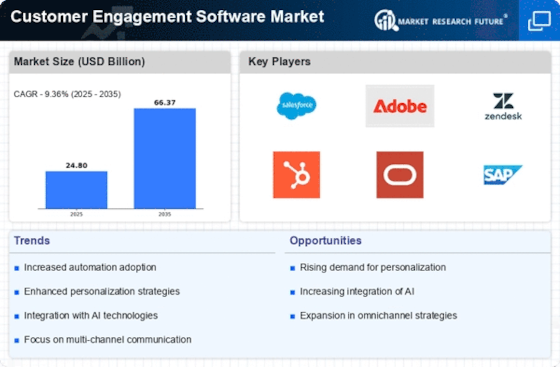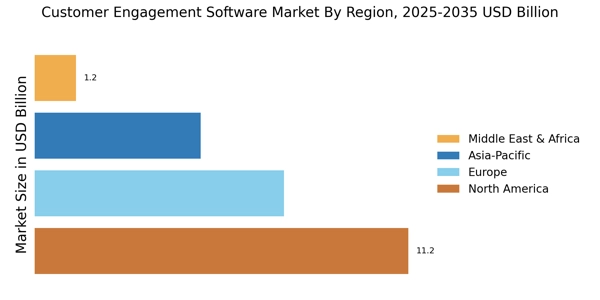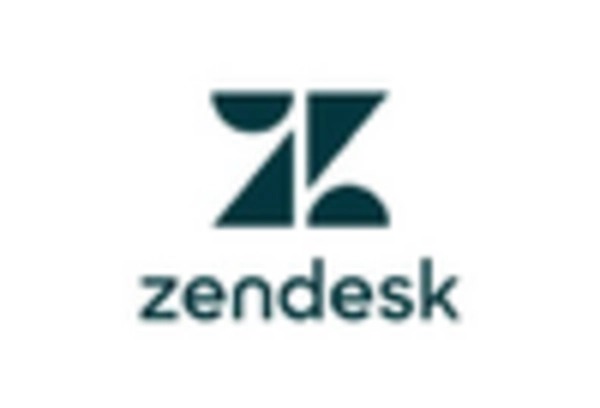Rise of Digital Transformation
The ongoing digital transformation across various sectors appears to be a primary driver for the Customer Engagement Software Market. Organizations are increasingly adopting digital tools to enhance customer interactions and streamline operations. According to recent data, the digital transformation market is projected to reach a value of over 1 trillion dollars by 2025, indicating a robust demand for software solutions that facilitate customer engagement. This trend suggests that businesses are prioritizing technology investments to improve customer experiences, thereby driving the growth of the Customer Engagement Software Market. As companies seek to remain competitive, the integration of advanced software solutions becomes essential for fostering meaningful customer relationships.
Adoption of Artificial Intelligence
The integration of artificial intelligence (AI) into customer engagement strategies is emerging as a crucial driver for the Customer Engagement Software Market. AI technologies enable businesses to analyze vast amounts of customer data, allowing for more personalized interactions and predictive analytics. The AI market is expected to grow significantly, with estimates suggesting it could reach 190 billion dollars by 2025. This growth indicates a strong inclination towards leveraging AI in customer engagement software, as organizations seek to automate processes and enhance decision-making. Consequently, the Customer Engagement Software Market is likely to expand as companies adopt AI-driven solutions to improve customer interactions and operational efficiency.
Increased Focus on Customer Experience
The heightened emphasis on customer experience is significantly influencing the Customer Engagement Software Market. Companies are recognizing that superior customer experiences can lead to increased loyalty and retention. Research indicates that organizations that prioritize customer experience outperform their competitors by nearly 80% in terms of revenue growth. This realization is prompting businesses to invest in customer engagement software that provides tools for personalized communication and feedback collection. As a result, the Customer Engagement Software Market is witnessing a surge in demand for solutions that enable businesses to understand and respond to customer needs effectively, thereby enhancing overall satisfaction.
Expansion of Mobile Engagement Solutions
The proliferation of mobile devices is driving the demand for mobile engagement solutions within the Customer Engagement Software Market. As consumers increasingly rely on smartphones for communication and shopping, businesses are compelled to adapt their engagement strategies accordingly. Data indicates that mobile engagement solutions are expected to grow at a compound annual growth rate of over 25% through 2025. This growth highlights the necessity for customer engagement software that is optimized for mobile platforms, allowing businesses to reach customers effectively. Consequently, the Customer Engagement Software Market is likely to expand as organizations invest in mobile-friendly solutions to enhance customer interactions and accessibility.
Growing Demand for Analytics and Reporting
The increasing demand for analytics and reporting capabilities is shaping the Customer Engagement Software Market. Businesses are recognizing the importance of data-driven decision-making in enhancing customer engagement strategies. The analytics software market is projected to grow to approximately 70 billion dollars by 2025, reflecting a strong need for tools that provide insights into customer behavior and preferences. This trend suggests that organizations are seeking customer engagement software that not only facilitates communication but also offers robust analytics features. As a result, the Customer Engagement Software Market is likely to experience growth as companies invest in solutions that enable them to track performance metrics and optimize their engagement efforts.
.png)

















